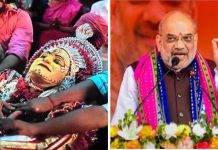
The President of Bharatiya Janata Party and the key man behind the win of Narendra Modi in this year’s Lok Sabha elections, Amit Shah has been inducted as the Home Minister in the Modi 2.0 government. Speculations are already rife as to how he will tackle the anti-Indian and anti-social elements in the country. What will be his responsibilities as a Home Minister? Here we bring you the details in brief.
Primary Responsibilities Of MHA
The primary responsibilities of the Ministry of Home Affair are to maintain internal security, look after the governance issues between the states and the center, and disaster management.
There are several other key functions that the MHA performs including union territories administration, border management, and implementation of provisions, for example, that of official languages and conduction of population census once every 10 years.
The Indian Constitution states that MHA has to maintain public and police order in the state and provide the state governments financial assistance for updating state police forces, weaponry, communication equipment, training, police infrastructure, and mobility and assistance of central armed police forces when needed.

Tasks & Responsibilities Of Home Minister
1. Law & Order
It includes the issues related to policing, modernization of law and order and its weaponry that is a part of training IPS officers and more.
2. Intelligence Bureau
IB is completely under the control and command of Home Minister. It is the responsibility of HM to control and evaluate all the Intelligence inputs that come from the ATS, RAW, state govt. and military intelligence.
3. J & K
Since Jammu and Kashmir has strategic importance the home ministry has the complete responsibility of the Law and Order situation in Kashmir. The importance of the responsibility of this state in India is all the more significant considering the number of paramilitary forces and training of police personnel involved here.

4. Overseeing Policing Of North-East
The Home Minister also has to oversee the Northeastern policies related to Security, policing, and the overall stability of the region. Home Ministry frames all the development policies having strategic importance.
5. Control Over Paramilitary Forces
Paramilitary forces such as SSB, ITBP, CRPF, BSF, and CISF come under the jurisdiction of the Home Ministry.

6. Border Regions’ Security
Although when it comes to defending our boundaries it is the army that takes the action, the actual security work of border regions is carried out under Home Ministry.
7. Anti-Terror Force NSG
NSG is an elite anti-terror force for emergency situations which is also a part of the Home Ministry.
8. Complete Authority Of CBI
Similar to the agencies mentioned above, the Home Minister also has to control the Central Bureau of Investigation (CBI) under which he has to recruit the police officers and also their further training.

9. Appointment Of Governor
The Home Ministry also appoints the governors of different states in India on the recommendation.
10. Tackling Maoist Problem
The rise in Naxal activities in the last couple of decades has led to the formation of this new policy branch of the Home Ministry. These are the least developed areas of the country where the Home Ministry as a part of its Integrated Development action can post Paramilitary forces and ensure securities of installations of strategic importance.
In nutshell, Home Ministry serves as the Central Nervous system of India and the Home Minister as its controller.


































